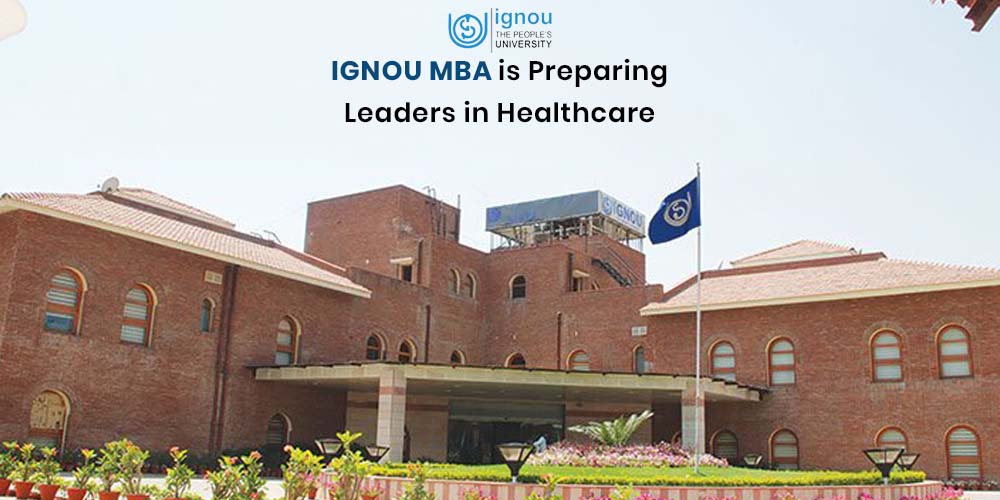Turning the Future of Healthcare by MBA program of IGNOU
IGNOU Unlocking the “Tech-Touched Treatment” by MBA program in Healthcare Management
The Indira Gandhi National Open University (IGNOU) has recently launched an MBA program specializing in healthcare and hospital management, specifically designed to cultivate a proficient workforce capable of serving in hospitals, allied organizations, and healthcare facilities across both public and private sectors. This program aims to provide effective support and management solutions for the healthcare sector as well as emphasize delivering high-quality healthcare nationwide including in remote areas.
To be eligible to apply for the course applicants must hold a bachelor's degree of at least three years and should have achieved a minimum of 50% aggregate marks (45% for reserved category applicants).
The MBA HCHM program will be conducted over four semesters, with a total of 112 credits. In the First Semester of an MBA in Hospital management, students will learn 7 core courses, each worth four credits, followed by seven courses with four credits in the next semester. In the third semester, students will have specialized courses to make them technically competent to deal with obstacles in the Healthcare field. Along with training in hospitals and healthcare institutions, students would be asked to complete the assigned projects. The last semester will be a continuation of the specialised course along with a three-month internship.
For this course candidates have to pay INR 15,500 for the first semester, INR 15,500 for the second semester, INR 19,500 for the third, and INR 17,500 for the fourth semester. The structured approach ensures that students not only gain theoretical knowledge but also practical experience essential for roles in healthcare management upon completion of the MBA in Health and Hospital Management program at IGNOU.
By pursuing this course students will:
Develop theoretical knowledge: Students will learn practical skills in hospital management as well as implement scientific methods for the administration of people, materials, finances, communication, and resource management.
Learn advanced technologies: Acquire knowledge of contemporary management strategies such as economic order quantity (EOQ), operational research, inventory control, organizational development, and management information systems. Students will plan to deal with issues in Hospital management.
Assessment of Clinical and Non-Clinical Needs: In inpatient care settings, students will be able to assess both non-clinical (administrative, logistical) and clinical (direct patient care) needs. This entails being aware of the needs of medical professionals and paramedic staff and making sure that resources are allocated and coordinated efficiently.
Application of General Management Principles: To maximise efficiency, students will learn how to apply general management principles across a range of healthcare services. Planning strategically, managing resources, and developing organizations that are suited to healthcare environments are all part of this.
Planning and Designing Hospital Facilities:
The course will include the hospital's physical facility planning and design. The infrastructure needed to provide high-quality healthcare services will be understood by students, who will also be able to ensure that facilities meet patient care and operational efficiency standards.
Principles and Practices of Health Care Management:
With an emphasis on their interactions with medical treatment in hospital settings, students will obtain an understanding of health management ideas and practices. This necessitates being aware of patient safety procedures, quality control, and healthcare delivery systems.
Utilisation of Epidemiological Techniques:
Learning epidemiological techniques enables students to study disease prevalence and patterns within communities. This data-driven approach aids in planning and optimizing healthcare services to meet population health needs effectively.
Application of Biostatistics:
For planning, decision-making, reviewing professional services, and conducting medico-administrative research, students will use biostatistics. This includes analyzing statistical data, evaluating healthcare data, and using the results to improve management and delivery procedures.
Editor’s Note:
Students enrolled in the IGNOU MBA in Healthcare and Hospital Management program graduate with a broad range of competencies required for efficient healthcare management. Graduates are equipped to handle a variety of difficulties in healthcare administration, improve patient care outcomes, and promote the delivery of healthcare services in a variety of contexts by fusing theoretical knowledge with practical applications. This initiation of the IGNOU MBA program is poised to transform the future of the healthcare system of India, making it more accessible and convenient for patients. Skobuzz applauds IGNOU's technical initiative to cultivate a new, technologically proficient generation for our country's healthcare system.














0 Comments (Please Login To Continue)